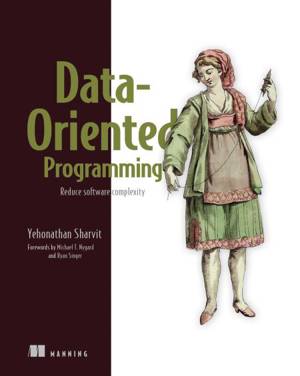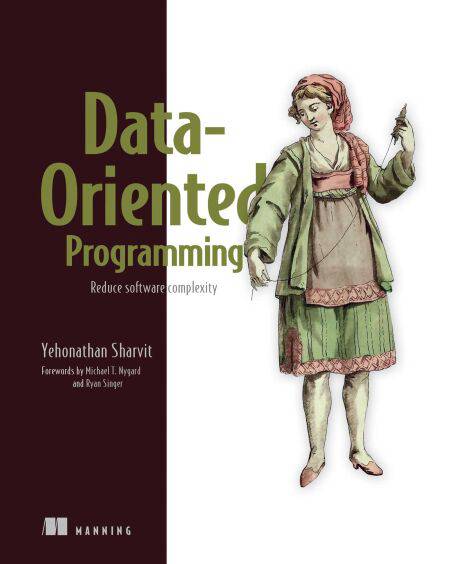
En raison d'une grêve chez bpost, votre commande pourrait être retardée. Vous avez besoin d’un livre rapidement ? Nos magasins vous accueillent à bras ouverts !
- Retrait gratuit dans votre magasin Club
- 7.000.000 titres dans notre catalogue
- Payer en toute sécurité
- Toujours un magasin près de chez vous
En raison de la grêve chez bpost, votre commande pourrait être retardée. Vous avez besoin d’un livre rapidement ? Nos magasins vous accueillent à bras ouverts !
- Retrait gratuit dans votre magasin Club
- 7.000.0000 titres dans notre catalogue
- Payer en toute sécurité
- Toujours un magasin près de chez vous
49,20 €
+ 49 points
Format
Description
Eliminate the unavoidable complexity of object-oriented designs. The innovative data-oriented programming paradigm makes your systems less complex by making it simpler to access and manipulate data.
In Data-Oriented Programming you will learn how to:
Separate code from data
Represent data with generic data structures
Manipulate data with general-purpose functions
Manage state without mutating data
Control concurrency in highly scalable systems
Write data-oriented unit tests
Specify the shape of your data
Benefit from polymorphism without objects
Debug programs without a debugger
Data-Oriented Programming is a one-of-a-kind guide that introduces the data-oriented paradigm. This groundbreaking approach represents data with generic immutable data structures. It simplifies state management, eases concurrency, and does away with the common problems you’ll find in object-oriented code. The book presents powerful new ideas through conversations, code snippets, and diagrams that help you quickly grok what’s great about DOP. Best of all, the paradigm is language-agnostic—you’ll learn to write DOP code that can be implemented in JavaScript, Ruby, Python, Clojure, and also in traditional OO languages like Java or C#.
Forewords by Michael T. Nygard and Ryan Singer.
About the technology
Code that combines behavior and data, as is common in object-oriented designs, can introduce almost unmanageable complexity for state management. The Data-oriented programming (DOP) paradigm simplifies state management by holding application data in immutable generic data structures and then performing calculations using non-mutating general-purpose functions. Your applications are free of state-related bugs and your code is easier to understand and maintain.
About the book
Data-Oriented Programming teaches you to design software using the groundbreaking data-oriented paradigm. You’ll put DOP into action to design data models for business entities and implement a library management system that manages state without data mutation. The numerous diagrams, intuitive mind maps, and a unique conversational approach all help you get your head around these exciting new ideas. Every chapter has a lightbulb moment that will change the way you think about programming.
What's inside
Separate code from data
Represent data with generic data structures
Manage state without mutating data
Control concurrency in highly scalable systems
Write data-oriented unit tests
Specify the shape of your data
About the reader
For programmers who have experience with a high-level programming language like JavaScript, Java, Python, C#, Clojure, or Ruby.
About the author
Yehonathan Sharvit has over twenty years of experience as a software engineer. He blogs, speaks at conferences, and leads Data-Oriented Programming workshops around the world.
Table of Contents
PART 1 FLEXIBILITY
1 Complexity of object-oriented programming
2 Separation between code and data
3 Basic data manipulation
4 State management
5 Basic concurrency control
6 Unit tests
PART 2 SCALABILITY
7 Basic data validation
8 Advanced concurrency control
9 Persistent data structures
10 Database operations
11 Web services
PART 3 MAINTAINABILITY
12 Advanced data validation
13 Polymorphism
14 Advanced data manipulation
15 Debugging
In Data-Oriented Programming you will learn how to:
Separate code from data
Represent data with generic data structures
Manipulate data with general-purpose functions
Manage state without mutating data
Control concurrency in highly scalable systems
Write data-oriented unit tests
Specify the shape of your data
Benefit from polymorphism without objects
Debug programs without a debugger
Data-Oriented Programming is a one-of-a-kind guide that introduces the data-oriented paradigm. This groundbreaking approach represents data with generic immutable data structures. It simplifies state management, eases concurrency, and does away with the common problems you’ll find in object-oriented code. The book presents powerful new ideas through conversations, code snippets, and diagrams that help you quickly grok what’s great about DOP. Best of all, the paradigm is language-agnostic—you’ll learn to write DOP code that can be implemented in JavaScript, Ruby, Python, Clojure, and also in traditional OO languages like Java or C#.
Forewords by Michael T. Nygard and Ryan Singer.
About the technology
Code that combines behavior and data, as is common in object-oriented designs, can introduce almost unmanageable complexity for state management. The Data-oriented programming (DOP) paradigm simplifies state management by holding application data in immutable generic data structures and then performing calculations using non-mutating general-purpose functions. Your applications are free of state-related bugs and your code is easier to understand and maintain.
About the book
Data-Oriented Programming teaches you to design software using the groundbreaking data-oriented paradigm. You’ll put DOP into action to design data models for business entities and implement a library management system that manages state without data mutation. The numerous diagrams, intuitive mind maps, and a unique conversational approach all help you get your head around these exciting new ideas. Every chapter has a lightbulb moment that will change the way you think about programming.
What's inside
Separate code from data
Represent data with generic data structures
Manage state without mutating data
Control concurrency in highly scalable systems
Write data-oriented unit tests
Specify the shape of your data
About the reader
For programmers who have experience with a high-level programming language like JavaScript, Java, Python, C#, Clojure, or Ruby.
About the author
Yehonathan Sharvit has over twenty years of experience as a software engineer. He blogs, speaks at conferences, and leads Data-Oriented Programming workshops around the world.
Table of Contents
PART 1 FLEXIBILITY
1 Complexity of object-oriented programming
2 Separation between code and data
3 Basic data manipulation
4 State management
5 Basic concurrency control
6 Unit tests
PART 2 SCALABILITY
7 Basic data validation
8 Advanced concurrency control
9 Persistent data structures
10 Database operations
11 Web services
PART 3 MAINTAINABILITY
12 Advanced data validation
13 Polymorphism
14 Advanced data manipulation
15 Debugging
Spécifications
Parties prenantes
- Auteur(s) :
- Editeur:
Contenu
- Nombre de pages :
- 424
- Langue:
- Anglais
Caractéristiques
- EAN:
- 9781638356783
- Date de parution :
- 26-09-22
- Format:
- Ebook
- Protection digitale:
- Adobe DRM
- Format numérique:
- ePub

Les avis
Nous publions uniquement les avis qui respectent les conditions requises. Consultez nos conditions pour les avis.






